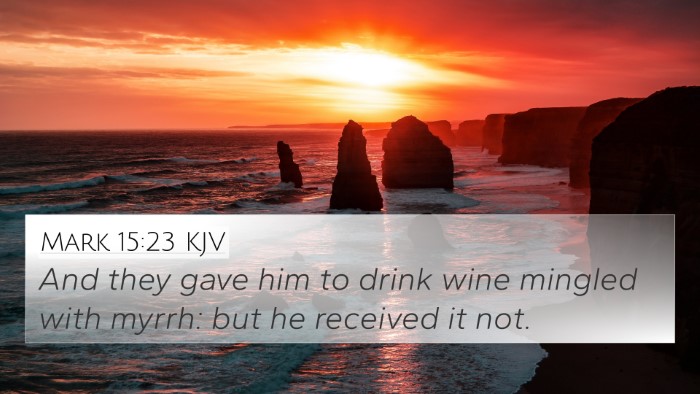Understanding Matthew 27:34
Matthew 27:34 states: "They gave Him vinegar to drink mingled with gall: and when He had tasted thereof, He would not drink." This verse is part of the crucifixion narrative of Jesus and carries deep theological significance as it illustrates the suffering and rejection He faced during His final hours.
Summary of Insights from Public Domain Commentaries
This verse has been analyzed by various biblical scholars, revealing layers of meaning through comparative analyses of Scripture, historical context, and prophetic fulfillments.
Matthew Henry Commentary
Matthew Henry remarks on the fulfillment of prophecy in this verse, noting that the offering of vinegar mixed with gall fulfills Psalm 69:21, which states, "They gave me also gall for my meat; and in my thirst they gave me vinegar to drink." This is a poignant reflection of the mockery Jesus endured as the crowds sought to belittle Him even in His anguished state.
Albert Barnes Commentary
Albert Barnes points out that the gall served to Jesus represents the bitterness of sin, while the vinegar illustrates humanity's rejection of divine grace. He emphasizes that Jesus chose not to drink it, signifying His commitment to fully experiencing human suffering without mitigation. This decision highlights Jesus' role as the sacrificial Lamb, taking on the full weight of the world’s sins.
Adam Clarke Commentary
Adam Clarke further elaborates on the significance of the gall and vinegar, suggesting that it might have been offered as a form of pity to alleviate Jesus' pain. However, by refusing it, Jesus exemplifies His mission to endure the suffering of the cross without compromise. Clarke underscores the fulfillment of Isaiah 53, where the suffering servant bears the sorrows of the people.
Thematic Connections and Cross-References
This verse intricately connects with multiple scriptures, enriching our understanding of Jesus’ suffering and the overarching narrative of redemption:
- Psalm 69:21: "They gave me gall for my food, And for my thirst they gave me vinegar to drink."
- Isaiah 53:3-5: "He is despised and rejected by men, A Man of sorrows and acquainted with grief."
- John 19:28: "After this, Jesus, knowing that all things were now accomplished, that the Scripture might be fulfilled, said, 'I thirst!'"
- Mark 15:23: "They gave Him wine mingled with myrrh to drink: but He received it not."
- Matthew 26:39: "And He went a little farther, and fell on His face, and prayed, saying, 'O My Father, if it is possible, let this cup pass from Me; nevertheless, not as I will, but as You will.'
- Philippians 2:7-8: "But made Himself of no reputation, taking the form of a bondservant, and coming in the likeness of men. And being found in appearance as a man, He humbled Himself and became obedient to the point of death, even the death of the cross."
- Luke 22:42: "Saying, 'Father, if You are willing, take this cup away from Me; nevertheless not My will, but Yours, be done.'
- Luke 23:36: "The soldiers also mocked Him, coming and offering Him sour wine."
- Revelation 21:4: "And God will wipe away every tear from their eyes; there shall be no more death, nor sorrow, nor crying. There shall be no more pain, for the former things have passed away."
Conclusion
The examination of Matthew 27:34, enriched by insights from public domain commentaries, highlights the significance of Jesus's decision to refuse the gall and vinegar. This act showcases His commitment to fulfilling the Scriptures and enduring the full brunt of human suffering. It draws connections across different biblical texts that elevate the understanding of His sacrifice.
Cross-Referencing and Thematic Analysis
This exploration serves as an excellent illustration of cross-referencing Biblical texts, enabling deeper insights and a more profound grasp of interconnected themes. Engaging with a Bible concordance or a Bible cross-reference guide can illuminate these connections, enhancing personal study and understanding.
Tools for Cross-Referencing
- Use of a Bible reference resource to identify themes and connections.
- Employing cross-reference Bible study methods to explore interconnections.
- Utilizing a comprehensive Bible cross-reference system for deeper biblical inquiry.
- Engaging in a comparative study of Pauline epistles to see theology in action across letters.
User Intent and Exploration
Understanding what verses relate to Matthew 27:34 can enhance one's study and allow for more profound reflections on the significance of His suffering. Queries such as "What verses are related to Matthew 27:34?" or "How do Matthew 27:34 and Psalm 69:21 connect?" can lead to enlightening discoveries.
By studying cross-referenced themes and identifying connections between the Old and New Testament, believers can grow in faith and appreciation for the complexity and beauty woven throughout Scripture.






